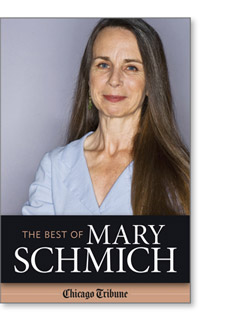| « Write Club Goes to Couples Therapy | Indie Publisher Announces New E-Book Series » |
Interview Mon Oct 22 2012
Local Publisher Partners with Tribune to Produce New Ebook Collection
"From what I can tell, our project is the biggest and most ambitious that any newspaper is doing in the United States," said Doug Seibold, president of the Evanston-based publisher Agate.

Seibold's referring to the recent collaboration between Agate and the Chicago Tribune to release a series of ebooks created from the newspaper's vast archive of news and feature stories, columns and photography. The Chicago Tribune Ebook Collection currently consists of 20 titles, among them The Best of Mary Schmich, a selection of the the Pulitzer-Prize winning columnist's favorite pieces; Charlie Trotter, the story of the world-famous chef's restaurant in Chicago; and The Rise of Rahm, which chronicles the ascent of the first non-Daley Chicago mayor in more than 20 years.
And while other newspapers, including The Wall Street Journal, the Los Angeles Times, and The Washington Post, have taken similar steps to release archived material on ebook, none have come close to the quantity the Tribune/Agate partnership has yielded--according to Seibold, they'll offer a total of 50 titles by January 1 of next year. And (perhaps best of all) they're only $4.99 a piece.
Gapers Block Book Club chatted with Seibold to get the scoop on the partnership, and the state and future of digital content:
Tell us a little more about Agate Digital, the imprint under which the Tribune ebooks are published.
I had the idea to start a new imprint devoted to standalone ebooks some time ago, and that's the basic idea for Agate Digital: to explore the new kind of publishing possible when you're untethered from the print book. I started exploring different collections of material that are not typically pursued in print, mostly because they're not seen as having commercial potential: essay collections, drama, poetry, short fiction. And I started to pursue relationships with organizations that created a lot of content for whom we could create books.
And how did the Tribune come into the picture?
Certainly they were interested in exploring ebooks as soon as it became more apparent they were something readers were interested in. Like a lot of media organizations they'd been exploring different options and performing different experiments, and they'd already created a few ebooks before I started working with them.
We'd actually done a print cookbook with the Tribune published back in 2011, and I met a few folks there who ultimately led me to a vice president at the Tribune named Joycelyn Winnecke, and with Joyce I really began to work and flesh out what was going to be the right kind of collaboration.
Why did you aim to publish such a relatively large number of ebooks?
A lot of other organizations are doing a handful of books and then seeing what happens. And I think the thing that Joyce and I worked out was trying to explore the opportunity that comes with doing a really big number and a wide variety of books, so that we could experiment with everything that goes into making and marketing them, and really see what's going to appeal to readers.
How do the ebooks maintain a narrative flow, since the articles are written by a range of journalists?
It really varies. A lot of the books are straightforward compilations; a good example of that would be the collection of Mary Schmich columns, or some of the recipe books that we've done. But other books really do have more of a narrative character, and a good example is the book about Charlie Trotter.
What emerged in looking at all the material about Trotter is that we saw a through-line that was really about the history of the restaurant. So we went to them and said we feel like the story here is the history of the restaurant, from opening to closing. And so the material we included in the book was related to that. We bypassed the things that had to do with Trotter's other efforts, like his restaurants in other cities, his To-Go business, or his TV show.
What's some of the oldest archived material readers can now explore through a Tribune ebook?
Of the books we've done so far, I think the Capone book goes back deepest. That's material that goes back 80-plus years. But we hope to go as deep as possible into their archives to tell even older stories -- the challenge is just how much the Trib itself has done to digitize that content.
Do you think all major newspapers will be doing this in the future?
One of the things I talk to everybody about this, in terms of understanding how we're looking at it, is it's not just about digitizing printed books. It's about monetizing the web. And that's something that newspapers and other traditional content creators have been trying to figure out for a long time. There's been an enormous amount of content on the web, and people are accustomed to not paying for it. But people are used to paying for chunks of content in this format we call a book, and they've transferred that consumer behavior to the web.
And my feeling is, if you're a newspaper company, why not see ebooks as a natural evolution for some of your content, in terms of its long-term life and long-term availability? Because it's an excellent way for readers to tee up material by topic or author or any other way you'd like to slice it. To be able to access this information and produce it in a format that people like, and that people feel is appealingly priced, is a big part of where the opportunity lies here.
For more information, or to purchase an ebook, visit Agate Publishing or the Chicago Tribune.










BG / October 23, 2012 10:54 AM
Smells like bankruptcy and a slow slide into irrelevance.